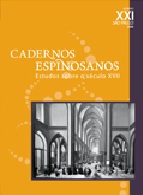Hermeneutics and subjective pluralism: the foundation of freedom in Spinoza’s thought
DOI:
https://doi.org/10.11606/issn.2447-9012.espinosa.2009.89368Keywords:
Freedom, Biblical hermeneutic, Faculty to judgeAbstract
The main aim in this paper is to expose one of the greatest aspirations of Spinoza’s philosophy: the liberation of the faculty to judge as hermeneutic perspective as well as in its political sense. Taking this concept as starting point, our aim is to reconstruct some of the interstices of the philosopher’s program, who is always emphatic with regard to the freedom in ethical and political ambit, as well as to reconstitute the several senses that this concept has in his work. Is there a freedom that is sub specie aeternitatis conceived and another that is sub specie durationis? This question leads us to establish the relation that this philosopher has to the political world’s things, which he always thinks in terms of passions and interests, excluding from it a sense of freedom in which it is conceived as virtuous. Without abandoning the aspirations of a superior sense of freedom, the author maintains that Spinoza proposes to examine the problem of freedom in a context in which there are more prejudices than adequate ideas, more fear than hope, more superstition than wisdom.Downloads
Download data is not yet available.
Downloads
Published
2009-12-15
Issue
Section
Artigos
License
Autores que publicam nesta revista concordam com os seguintes termos:
- Autores mantém os direitos autorais e concedem à revista o direito de primeira publicação, com o trabalho simultaneamente licenciado sob a Licença Creative Commons Attribution que permite o compartilhamento do trabalho com reconhecimento da autoria e publicação inicial nesta revista.
- Autores têm autorização para assumir contratos adicionais separadamente, para distribuição não-exclusiva da versão do trabalho publicada nesta revista (ex.: publicar em repositório institucional ou como capítulo de livro), com reconhecimento de autoria e publicação inicial nesta revista.
Authors who publish in this journal agree to the following terms:
a. Authors retain copyright and grant the journal the right of first publication with the work simultaneously licensed under the Creative Commons Attribution License that allows to share the work with an acknowledgment of its authorship and initial publication in this journal.
b. Authors are authorized to take on additional contracts separately, to non-exclusive distribution of the article published in this journal (ex.: to publish in institutional repository or as part of a book), with an acknowledgment of its initial publication in this journal.
How to Cite
Santoyo, V.-M. P. (2009). Hermeneutics and subjective pluralism: the foundation of freedom in Spinoza’s thought. Cadernos Espinosanos, 21, 41-82. https://doi.org/10.11606/issn.2447-9012.espinosa.2009.89368


